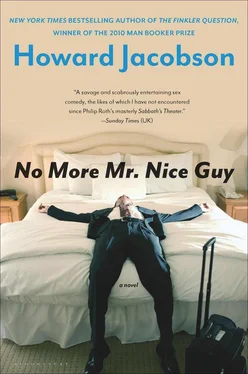And of course Gordon. Though Gordon, strictly speaking, doesn’t count. Benedict’s words are not intended to drive you to suicide. Day by day remind yourself is an injunction to morbid longevity, whereas Gordon is increasingly looking to Frank like a man meaning to end it all. ‘So there it is,’ he says one morning in the guests’ kitchen. Apropos nothing in particular. So there it is. Frank sees a subtly fatalistic progression here from Gordon’s usual ‘Yes indeed’. So there it is. So there it was. It’ll be over for him before the day’s out, Frank thinks. They’ll find him face down in the stream. But the following morning Frank runs into him in the kitchen early, buttering toast and loading it with marmalade. ‘Lovely day,’ Frank says. ‘Yes indeed,’ Gordon replies. So he isn’t really serious either.
As for the other retreatants, those Frank cannot avoid speaking to are here only because yoga and meditation and marriage counselling have failed. Next week they’ll be Hare Krishnas. ‘I’ve just been reading a book about losing yourself through drugs, the way Mexicans do,’ one of them says to him, as they’re feeling their way back from vespers in the dark. ‘By someone called Audrey Huxley.’
‘I think I know a book a bit like that,’ Frank says. ‘Except that the one I know is by Aldous Huxley.’
‘That’s her. That’s the one. Good book.’
And sitting reading quietly in the common room later that same afternoon, waiting to enter the hush of compline, he is accosted by a precociously grey grasshopper of a man with glacial green eyes and two sets of pupils, one not quite aligned behind the other, who has a desire to talk to him about himself. ‘I’ve succumbed to most things in life,’ he tells Frank. ‘Women, alcohol, meat, drugs. But they’re wrong. I’ve always known they were wrong, but now I know why they’re wrong …’
He waits for Frank to ask him to put flesh upon that why, but Frank has been here too long to ask anyone anything.
‘And I’ll tell you why,’ the man says at last. ‘Because it’s in the Book. Whatever you need is in that Book. My name’s Fletcher, by the way, what’s yours? OK — it’s out there, Frank. It’s waiting for you to find it. Seek and ye shall find. Knock and ye shall enter.’
‘Aha,’ Frank says. He knows all about seeking and knocking.
‘You might not think it to look at me,’ Fletcher continues, ‘but I’ve been everywhere. I’ve been entertainments manager on the QE2. I’ve flown Concorde. I’ve climbed the pyramids. I’ve dived off the cliffs at Acapulco. I’ve walked along the Chinese Wall. I’ve roller-skated on Venice beach. And I can still do all these things. But I know I’ve got to decide now between a life with love or a life without love. I’ve got to come down on one side or another. That’s why I’m here.’
Aha, Frank thinks. His wife’s sent him.
‘I know another good book on that subject,’ Frank says, getting up to go to prayers. ‘It’s by Audrey Huxley.’
They aren’t serious. They aren’t fit to fasten a real recluse’s sandals. They don’t acknowledge they’re dirt. They don’t day by day remind themselves they’ve had it. They’re all five more years men. They’ve all got the gimmies.
Frank doesn’t want anyone to give him anything. It’s good simply to be alive, watching the year die. Sitting in the cold, in a world without women, losing himself in plainsong. He knows he can’t stay with the monks forever. But whether he’ll get his own place up here in the dark, or go on a monastery crawl, six weeks here, two months there, he hasn’t yet decided. In the meantime, depletion grows on him. One wash basin, one narrow wardrobe, one single bed (and not a thought of the pity of it, oh the pity of it Iago, he and his dick going begging on a mattress, night after night), one electric socket, a single kitchen chair for his portable television and laptop computer — how much else does a man need?
He’s come full circle, from the first grand hotel room he slept in as a boy, marvelling at the teeming future that disclosed itself in every empty lavender-scented drawer, to this last lowly nutshell with its intimations only of the grave.
He’s so battened down that even his adversary the tempter doesn’t call on him any more. He’s safe from grandiosity — no one reads his column in this place, no one recognises him. He’s safe from the past — no ghosts of runny girls crook their fingers to him in the cloisters. No one sculpts his likeness in cappuccino froth. He’s an impregnable fortress. He’s so close to the ground no wind can blow him over.
And then Mel writes to him.
Once a week he’s been going into town to fax his copy and collect his mail. Mel is still sending him whatever comes through her letterbox that isn’t addressed solely to her. The bills and the takeaway pizza menus and the washing-powder samples all stuffed into a brown padded bag and addressed in love-me-not handwriting to Ritz, Poste Restante, Inverness, Scotland. She is in possession of no other information about his whereabouts. The monastery is his secret. He’s damned if he’s going to give her the satisfaction of thinking that he’s finally taken her advice. Isn’t this what she’s always wanted him to be — a fucking monk?
So what makes her write suddenly? What makes her enliven the usual anonymous litter with a personal enclosure, the briefest of notes on her Melissa Paul, pornographer, notepaper, but a note nonetheless — If you think you can be quiet now, you can come home —?
Does she know, or is it an inspired guess?
Has her new lover dumped her? Have they all?
And how can she be so sure that this scrap of insolent presumption is all it will take to get him to renounce every vow, kiss goodbye to compline and come charging down the motorway at a hundred miles an hour with his pancreas pumping poisons and his stomach plastered across the dashboard like seaweed on a rock?
Don’t make us laugh, Frank.
SO WHAT’S THE drill? Does he ring the bell or does he let himself in with his key?
You can come home, she wrote. Home. That entitles him to use his key, surely. But he’s been a monk for the past however many months. A guest in the house of God, not a homeowner. He doesn’t know whether he any longer has what it takes just to let himself in. Besides, his hands are shaking. He doubts if he could fit the key into the keyhole. Nerves? No. Yes. And the long drive. And the palsy of old age. His hands have been in the world for fifty years — of course they’re shaking.
He rings.
There is no answer.
There are lights on in the house. She could be in the back garden. It’s a chilly evening, but that wouldn’t deter her. She likes the cold and the dark. She likes sitting out under the stars in one of his cardigans. Submitting to the moon’s magnetic pull. If the moon could draw her colon out and clean it, she’d let it.
The garden was always the place she fled to escape him. He watched her sometimes, after they had fought, sitting out there as though she meant never to come inside again, sorrowful and lonely, her back turned on him and on the house, her gaze fixed on nothing. No matter what he had said to her, no matter what she had said to him, the sight of her absorbed into nature, wheeled around like an icy star herself, always broke his heart.
How many times had he gone out to her, to say he was sorry, to see if he could pluck her from the planetary pull, coax her back into the human world, the only world he comprehended. But it always fell out the same way. ‘What now?’ she would say, oppressed by the long shadow he cast, even in the dark.
Читать дальше












